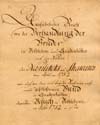 Gnadenhütten Journal - Comprehensive
Report
Gnadenhütten Journal - Comprehensive
Report

|
|
|
Report
of a Treaty held at Gnadenhütten on July 17th
1752
between two Nations of Nanticokes
and Shawnee on one side
and
their Brethren from Bethlehem
and Gnadenhütten on the other side.
After the Chiefs from both Nations, namely Nanticokes and Shawnee, appeared at the given time and place; they received the answer to their inquiry about the day when the Brethren would listen to their words, that it could take place today in the afternoon; which they were happy about, and asked for only one thing: that it take place where more of their and our people could be present, so as to hear everything that would be negotiated between us.
Afterwards we gathered on a small elevation on the other side of the Mahoney, right opposite of Gnadenhütten, at the foot of the steep mountain, which extends all the way to the Lecha [Lehigh]. There was a big area surrounded with many trees, which was cleared and in the middle mats were spread out and covered with a blue cloth. On both sides lay mats for sitting down, where at first the Chiefs of the Nanticokes and Shawnee sat down on the one side and the Brethren from Bethlehem and Gnadenhütten on the opposite side. Women and children sat in a circle within a short distance, so that again Gnadenhütters and Nanticokes and Shawnee sat apart from each other. And because the speakers always stood up, both sides could hear and understand everything.
Fire was made on both sides and there was a little basket of tobacco in the middle at their disposal; as it is customary among the Indians to smoke a pipe when they had something to say.
An opportune circumstance occurred when just before our gathering a thundershower cooled the weather and made it quite pleasant, for it had been unbearably hot before.
Hereupon an old Chief named Joinopom emerged with a double String of Wampum of 350 beads in his hand and reported his business in such a lively manner, and with such natural gesticulations, that one could almost learn what he was saying from his motions. After he had finished speaking another Chief called White took the aforementioned String in his hand and gave a report of the same speech in English. After that, Nathanael the Indian took up the String and reiterated the same speech to his people in Mahican. At last, Brother Joseph took it from him and presented exactly the same in German. The above mentioned speech was as follows:
"The Chiefs of two Nations present here, namely the Nanticokes and Shawnee, tell the Mahicans from Gnadenhütten (by which they also mean the white Brethren from Bethlehem, because they are all one) Brothers! This String of Wampum should first wipe your eyes, so that you become cheerful, it should clean your ears, so that you hear better, it should dry off your sweat, so that you become lively, it should make your throat smooth, so that everything goes down nicely, it should cleanse your insides, so that evil does not find shelter in you and good has entrance. Brethren Mahican!" Here he pointed to white and brown Brethren and said: "I mean white and brown with that, for you are one, as we, the Nanticokes and Shawnee are one. It is a double string, yet it holds together, and that’s how we look upon you. You reported to us in the Spring that you would like to talk to us about the one who is up there (he pointed to with his finger to the sky) we have taken up the matter fully and are very satisfied with it. Our Chiefs deliberated over this among themselves and they are pleased with it. We told our youth about it, and they have answered us, what our Chiefs want is also right for us. We spoke with our women about it, and they testified, that they felt the same way as us. The children, many of whom are present and listening, know about it and are happy and say they would also like to hear. Children in their mothers’ wombs, even though they can’t speak yet, say nevertheless, that once we come into the world, we will be fond of what our Chiefs did to serve our best interests." Every proposition was concluded with an acclamation from both sides.
Translation by Rachel Wheeler & Irakly Chkhenkely
